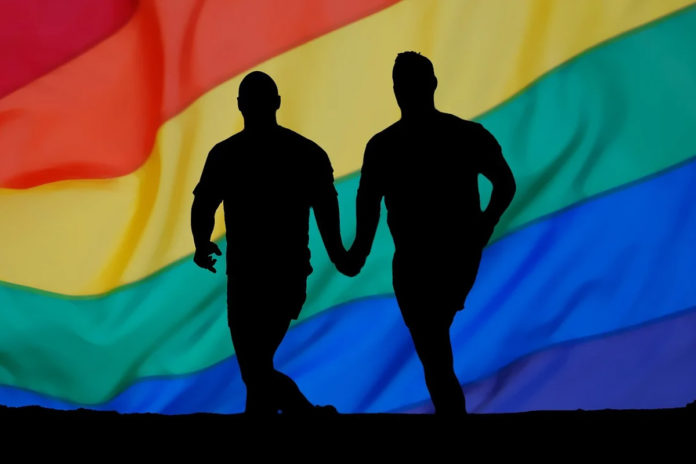
The homophobic posters are spreading misinformation in the name of “protecting family values.”
Trigger warning: Homophobia, queerphobia
Homophobic posters cropped up overnight in Kerala’s Alappuzha, on Sunday, July 24, the same day a rationalist group organised a pride march here. The posters put up by anonymous persons are not only homophobic but also provide unscientific information about the spread of monkeypox by placing the blame on LGBTQIA+ persons.
Under the guise of ‘Pride Awareness Campaign’ and “protecting family values”, the posters are in reality regressive and hateful. In one, a man and a woman (supposedly parents) are shown holding an umbrella over two little children, preventing rainbow coloured rain from falling over them (that is, ‘protecting’ them from the rainbow colors that are associated with pride). In another illustration, a hand that looks like that of a devil’s holds a rainbow passing through it. Both of these posters have a question: “Why give the name of nature to perversion?” Other posters included clippings of news about monkeypox vaccines being offered to gay and bisexual men in some countries and about the spread of certain sexually transmitted diseases (STDs). One poster says, “The latest communicable disease monkeypox is also present in homosexuals. (sic)”
Racism and homophobia
This last poster especially carries dangerous messaging around LGBTQIA+ persons, particularly gay and bisexual people, despite multiple science and medical professionals saying that monkeypox is not an STD, not particular to gay individuals, and in fact, is a disease that spreads through touch and contact.
Ashish Jose Ambat, a scientist and pharma researcher who is openly queer, explains that monkeypox is caused by the monkeypox virus, which belongs to the orthopoxvirus genus in the family poxviridae virus, the primary host of which happens to be monkeys, and has been reported in multiple countries over years.
“This was first reported in humans in Africa in the 1970s, and only caused concern when it came to the west in 2003 in the US. As long as it was limited to Africa, not much attention was given to it, which shows apparent racism in negating health policy concerns of undeveloped countries by western countries. Since the 1970s, there have been multiple outbreaks,” Ashish said.
While the WHO did point out initially that monkeypox seems to be affecting men having sex with men more than others initially, it (and other international organisations like the UN) later clarified that that it is not a disease that particularly affects people of a certain sexuality, or only spreads through them. “Some cases have been identified through sexual health clinics in communities of gay, bisexual and other men who have sex with men. It is important to note that the risk of monkeypox is not limited to men who have sex with men. Anyone who has close contact with someone who is infectious is at risk,” the WHO said in an advisory on May 25. “Stigmatising people because of a disease is never ok. Anyone can get or pass on monkeypox, regardless of their sexuality,” it added.
Monkeypox is not an STD
As the WHO suggests, it could be that the disease is being identified among gay or bi men more because of testing in sexual health clinics. A New York Times interview with Gregg Gonsalves, an Associate Professor of epidemiology at the Yale School of Public Health offers another explanation: that in this outbreak, a person who had monkeypox attended a gay rave (a party), and the spread happened in that “social and sexual network”. That does not make monkeypox a “gay disease” or an STD (one that spreads through exchange or contact with bodily fluids like semen) – it is simply one that spreads through physical contact, and according to some scientists, usually a longer duration of contact rather unlike, say, just brushing past someone or a hug. The latter may not be zero risk, but is being seen as low risk.
“The ‘physical contact’ here need not be sexual contact because this isn’t a sexually transmitted disease. It can be any close proximity interactions, like social gatherings, touching objects, fabrics and surfaces that have been used by someone with monkeypox. The risk is highest when there is direct contact with a monkeypox patient’s rash or scabs,” Ashish said.
“Right now, most people who tested positive for the virus happen to be queer and that is what the data is based on. Vaccination is also being done. Monkeypox is a contagious and self-limiting disease, and does not have high mortality. But this homophobia, racism, and bigotry might lead to complications wherein a person does not disclose in case of an infection, fearing stigma,” they explained.
There is also research to show that the current rise in monkeypox cases could be related to the global waning of orthopoxvirus immunity. This is because smallpox vaccinations, which also gave immunity against monkeypox, were stopped after the disease was declared eradicated in the 1980s.
However, framing monkeypox as a disease affecting persons of a particular sexuality may end up further marginalising and restigmatising a group of people and prevent them from seeking medical attention, and accessing precautions, therapeutics, and healthcare.
It’s also important to remember that diseases that ARE sexually transmitted infections don’t necessarily only spread through sex. They can spread through a handful of other activities, typically those that involve blood. In the case of HSV, contact between lesions and open skin.
— jess kant (@jessdkant) July 23, 2022
The classification of STIs themselves may in fact be an issue, as it takes something without moral value, infection, and assigns it moral value in the context of a society which is incapable of admitting that people like to have sex and that that’s a completely fine thing to do.
— jess kant (@jessdkant) July 23, 2022
But when we behave and frame conversations as if MPX is an STI, and STIs have always been historically blamed on two groups: sex workers and LGBT people, we set the stage for a group or handful of groups to receive the rage of a burned out population looking for someone to blame.
— jess kant (@jessdkant) July 23, 2022
The overemphasis on zoonotic spillover early in the COVID-19 pandemic was not a useful way of passing information. It was a way of finding someone to blame. It was, to be crystal clear: white supremacy alleviating itself of the blame for a virus it would later fail to control.
— jess kant (@jessdkant) July 23, 2022
Homophobic groups are already joining “groomer” rhetoric with monkeypox misinformation, and this will bring us 40 years back to GRID.
“Gay-related immune deficiency” was a name given to HIV that allowed the larger population to treat HIV+ people as pariahs and let them die.
— jess kant (@jessdkant) July 23, 2022
Stigma against particular communities endangers them
Transgender rights activist Sreemayi says that the posters cropped up on the same day as the pride event conducted by Essense Global (a rationalist group) in Alappuzha. “The WHO announced that most of the cases have been reported in gay and bisexual men, which I understand could have been due to the outbreak at an LGBTQIA+ event. We should understand that anyone can get infected but it just happened to start spreading amongst the queer people. So, in the name of a disease, they are trying to ostracize and discriminate against a community of people. At this point, we should also remember how COVID-19 patients were treated at the beginning of the pandemic and the social stigma associated they faced,” she says.
Gay rights activist Unais likens the misinformation being spread against LGBTQIA+ people in the case of monkeypox to the targeted attack over members of Tablighi Jamaat as well as Muslims in 2020 over the spread of COVID-19 at a Jamaat event. “Now, it does not mean that only Muslims who attend that event get the disease or that they are the ones who spread the disease. Similarly, the Nipah outbreak happened in Kozhikode. Does it mean that only people from Kozhikode will get infected?” he asks.
Sreemayi also points out that there is no mention of a name or organisation in the offending posters. “This means that someone wants to mislead the society but they don’t want people to know that they are the ones misleading,” she adds.
Unais also points out that this homophobic poster campaign is similar to the recent online seminar conducted by the Kannur women’s wing of Jamat-e-Islami, where comparisons were made between homosexuality and paedophilia, and it was said that transgender persons are mentally ill. “Only this time, we don’t know who is behind the posters,” he adds. He also points out that another class was held for Kannur medical college students by a queerphobic Muslim group.
He says that the reason behind the repetition of such instances is that there is no concrete police action or any action taken against people spreading false information and hatred. “No police action or repercussions encourages them to continue doing it. When I tried to file a police complaint in a similar incident, I couldn’t because of financial and personal reasons. That is the condition of the legal system, which does not facilitate filing a complaint,” he adds. Unais also questions if people would have a similar outlook if a disease was reported primarily among heterosexual people: “Would those be labelled ‘heterosexual diseases’?”
The WHO, on July 23, declared monkeypox a public health emergency of international concern, and added that “for the moment this is an outbreak that is concentrated among men who have sex with men, especially those with multiple sexual partners.” However, it also warned against discrimination and stigma against a particular people.
Meanwhile, UNAIDS has also expressed concern about language used while reporting and writing about monkeypox “that reinforce homophobic and racist stereotypes and exacerbate stigma.” UNAIDS Deputy Executive Director Matthew Kavanagh, in a press statement, said, “Stigma and blame undermine trust and capacity to respond effectively during outbreaks like this one. Experience shows that stigmatising rhetoric can quickly disable evidence-based response by stoking cycles of fear, driving people away from health services, impeding efforts to identify cases, and encouraging ineffective, punitive measures. We appreciate the LGBTI community for having led the way on raising awareness – and we reiterate that this disease can affect anyone.”
(With inputs from Geetika Mantri)








